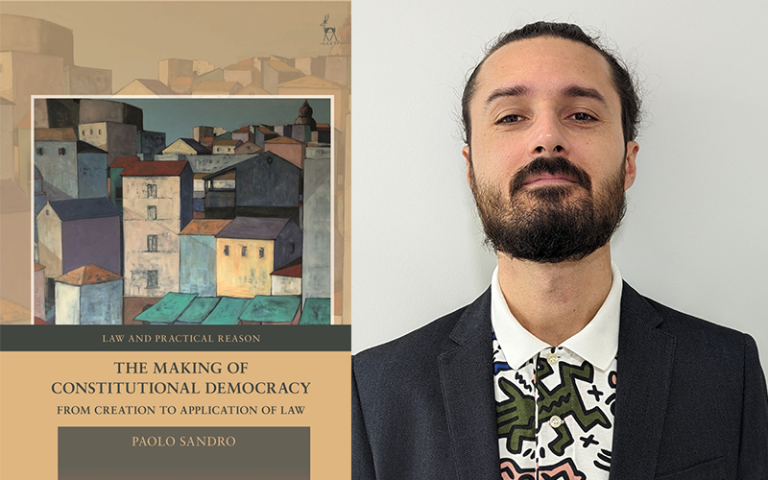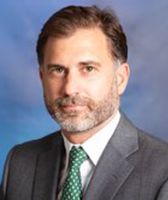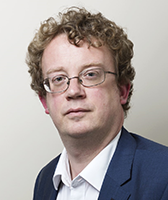Hybrid | The Making of Constitutional Democracy
28 February 2024, 2:00 pm–3:30 pm

This event is organised by the UCL Public Law Group
Event Information
Open to
- All
Organiser
-
UCL Laws
Location
-
UCL Faculty of LawsBentham House4-8 Endsleigh GardensLondonWC1H 0EG
Abstract
In this brief presentation Dr Sandro explains the (deceivingly) unassuming but fundamental theoretical problem which led him to write a book on the centrality of law-application to the theory and practice of constitutional democracy, and briefly illustrate how he tackles such a problem in the the book. If time allows, he will also briefly sketch the theory of constitutionalism as 'legal otherness' he defend in the work.
About the Paper
His first monograph 'The Making of Constitutional Democracy: From Creation to Application of Law' was first published by Hart in the prestigious Law and Practical Reason Series in 2022 and is now fully open access. It can be downloaded for free at https://papers.ssrn.com/sol3/papers.cfm?abstract_id=4562656
This open access book addresses a palpable, yet widely neglected, tension in legal discourse. In our everyday legal practices – whether taking place in a courtroom, classroom, law firm, or elsewhere – we routinely and unproblematically talk of the activities of creating and applying the law. However, when legal scholars have analysed this distinction in their theories (rather than simply assuming it), many have undermined it, if not dismissed it as untenable. The book considers the relevance of distinguishing between law-creation and law-application and how this transcends the boundaries of jurisprudential enquiry. It argues that such a distinction is also a crucial component of political theory. For if there is no possibility of applying a legal rule that was created by a different institution at a previous moment in time, then our current constitutional-democratic frameworks are effectively empty vessels that conceal a power relationship between public authorities and citizens that is very different from the one on which constitutional democracy is grounded. After problematising the most relevant objections in the literature, the book presents a comprehensive defence of the distinction between creation and application of law within the structure of constitutional democracy. It does so through an integrated jurisprudential methodology, which combines insights from different disciplines (including history, anthropology, political science, philosophy of language, and philosophy of action) while also casting new light on long-standing issues in public law, such as the role of legal discretion in the law-making process and the scope of the separation of powers doctrine.
Photo by Kenny Eliason on Unsplash
- About the Speaker
Dr Paolo Sandro is a Lecturer in Law at the University of Leeds. He holds a PhD in Legal Theory from the University of Edinburgh and one in Public Law from the University of Roma Tre (Rome). His work has been published, among others, in edited collections in legal theory by Springer and by Edward Elgar, in Res Publica, and in Rivista Italiana di Diritto Pubblico e Comunitario. His first monograph 'The Making of Constitutional Democracy: From Creation to Application of Law' was first published by Hart in the prestigious Law and Practical Reason Series in 2022 and is now fully open access. It can be downloaded for free at https://papers.ssrn.com/sol3/papers.cfm?abstract_id=4562656
- About the Commentators
Commentators for this Symposium include:

Tom Hickman is a Professor of Public Law at University College London. Tom is a Graduate of Cambridge University and the University of Toronto. He is a Barrister at Blackstone Chambers. He has been Standing Counsel to the Investigatory Powers Commissioner since 2017. Tom writes and teaches about constitutional law, administrative law, human rights and national security law.
He is author of Public Law After the Human Rights Act (2010) (Inner Temple Book Prize 2008-11 (new author)); co-author of Human Rights : Judicial Protection in the United Kingdom (2008).
Tom often blogs on the UK Constitutional Law Group Blog including well-known blog posts on access to justice (“Public Law’s Disgrace" (Part 1 and Part 2)) and “Pulling the Article 50 Trigger: Parliament’s Indispensable Role” with Jeff King and Nick Barber, which argued that legislation was necessary to trigger Article 50 and led to the Supreme Court's ruling in the Miller I case (in which Tom also acted as Counsel). A blog on the misuse of guidance during the Covid-19 pandemic is available here; and a blog on the Judicial Review and Courts Act 2022 here.
Tom's evidence to parliamentary committees has been referred to in a number of committee reports, such as the House of Lords Constitution Committee's June 2021 report on the use of emergency powers during Covid-19 pandemic and the report of the Privileges Committee in June 2022 on Select Committee's powers. Tom's evidence to the JCHR on the Bill of Rights (2022) can be found here.
In January 2020, Tom was the first person in the history of the Bundesverfassungsgericht to give oral evidence on foreign law to that Court, in the landmark BND Act case (his evidence was on interception of communication laws and oversight) (1 BvR 2835/17).
Tom was Awarded the Sutherland Prize for Legal History by the American Society of Legal History in 2016 for an essay on the law of seditious libel in eighteenth century England.
Tom is a practising barrister and King's Counsel at Blackstone Chambers.
Colm O’Cinneide is Professor of Constitutional and Human Rights Law at University College London (UCL). A graduate of University College Cork, he has published extensively in the field of comparative constitutional, human rights and anti-discrimination law. He has also acted as specialist legal adviser to the Joint Committee on Human Rights and the Women & Equalities Committee of the UK Parliament, and advised a range of international organisations including the UN, ILO and the European Commission. He also was from 2006-16 a member of the European Committee on Social Rights of the Council of Europe (serving as Vice-President of the Committee from 2010-4), and since 2008 has been a member of the academic advisory board of Blackstone Chambers in London.
- About the Group
The UCL Public Law Group is a community of scholars working in the field of public law, broadly understood. Our aim is to provide a supportive forum for the discussion and development of theoretical and doctrinal questions in constitutional theory, comparative constitutional law, human rights, judicial review, legal and political theory, and more.
- Book your place
You can attend this event in-person at UCL Faculty of Laws (Bentham House, 4-8 Endsleigh Gardens, London WC1H 0EG) or alternatively you can join via a live stream.
Please make sure you choose the correct ticket when booking your place.
 Close
Close

